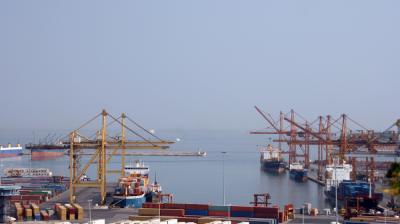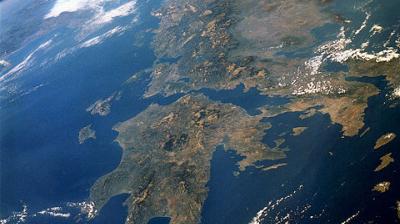The geopolitical implications of Sino-Greek relations
China's growing economic presence in Greece is not at present a major concern with regard to Greece's international position. However, this might change in the future if security concerns become more dominant in relations between China and the West. China is currently becoming more assertive in its own neighbourhood, and this will probably lead to increased tensions in Sino–American relations.
While, in the long-term, this bilateral relationship does not necessarily have to become hostile, this is perceived by many observers as a likely risk. The transition phase, when both great powers are adapting to new global and regional realities and a new balance of power, will be turbulent. As an ally of the United States, Greece should anticipate increased Sino–American tensions and deal with them through bilateral consultations with both countries – albeit of a slightly different nature with each of them. Moreover, Greece should also maintain a discreet but effective oversight of potentially problematic activities by any foreign investor on Greek territory.
The Changing Balance of Power in the Eastern Mediterranean
Changes in the global balance of power will be reflected at the regional level as well. The United States will remain the dominant player in the Middle East and the Eastern Mediterranean for the foreseeable future, and the European Union (EU) is expected to remain an influential actor, despite its current problems. Yet it would still be fairly safe to predict that the wider Middle East will gradually evolve into a multi-player security system. The expected substantial reduction in US energy dependence from the Middle East and the more general trend for the United States to pivot towards the Asia–Pacific region will have a substantial impact on the evolution of the regional security system.
China has adopted a policy of close relations with resource-rich states in Africa and the Gulf region. It has also limited its regional involvement to the economic sector, as Beijing is presently satisfied with the US guarantee on the security of supply lines. This may change, however, given China’s growing energy dependence.
Greece’s basic foreign policy orientation remains European (and Euro-Atlantic), but, following the example of many of its EU partners, it is trying to develop further its relations with key global and regional powers. Greece is not, therefore, uncomfortable with a greater role for China in the Mediterranean region, provided that China’s presence and activities fulfil the criteria of mutual economic benefits while having no destabilizing political consequences.
On the basis of mutual respect between two ancient civilizations, but also of common interests, Greece and China have been developing a strong bilateral relationship during the last few years. There has been an increase in the number of Greek companies that are present in the Chinese market and the level of bilateral trade has risen during the last five years (although it remains heavily favourable for China: Greek exports in 2012 were approximately 175 million euros, whereas Greek imports were 1,118 million euros).
Greece as a Regional Hub
Beijing appears to view Greece as a regional hub for increasing its economic (and perhaps in the future political) footprint in South-Eastern and Central Europe. The current economic crisis cannot but increase the attractiveness of such a prospect for Athens. Cosco, a Chinese state-owned company, has invested approximately 570 million euros in the port of Piraeus, with the promise of additional investment in the wider transport infrastructure sector (trains and airports).
Greece is hardly in a position to discourage foreign direct investment from almost any legitimate source. A certain diversification of foreign direct investment from countries outside the EU might even be welcome. On the basis of those expanding economic relations, political relations between the two countries are also expected to develop. Hopefully this will occur in a balanced way (that is, with Greece sufficiently politically and economically stable to drive a reasonably hard bargain regarding Chinese proposals, and even to reject them if deemed necessary on the basis of national interests and/or international obligations), without substantial divergence from European policies towards the emerging Asian superpower.
Despite its economic problems and the pressing need for foreign investments, Greece’s position is not fundamentally different from that of other EU countries when it comes to the geopolitical implications of having close investment relations with China, as long as Chinese investments in strategic infrastructure are not disproportional to those of other foreign investors and the Greek state retains a degree of control over those sectors.
Geopolitical Implications
As the Chinese presence in Southern Europe is currently perceived as being almost exclusively of a geo-economic nature, this development should not cause serious concern at the European or transatlantic level. An exception might be the arms embargo imposed by the EU on China, if increasing Chinese economic influence in the EU resulted in a renewed debate on a possible end to the embargo. Such a decision, which would certainly displease the United States, can ultimately be taken only by the EU’s major powers, not the smaller Southern European countries.
Should a new geopolitical dimension emerge in Sino–European relations in the future (for example, in the case of substantial political influence or military presence in Europe’s neighbourhood or coordinated efforts to penetrate and control sensitive sectors of national economies), or should EU–China relations become increasingly securitized, this may complicate China’s relations both with individual countries such as Greece, as well as with the EU or North Atlantic Treaty Organization (NATO). Such concerns should be addressed by involved parties through regular consultations, either at the bilateral, or the EU, or NATO level.
Although bilateral economic relations will remain the prerogative of individual states, when there is a foreign or security policy dimension there should be consultation in the context of relevant EU institutions. After all, if they continue to be divided and uncoordinated, European countries will remain at a serious disadvantage vis-à-vis great powers. Even if common policies on critical issues are the sensible thing to pursue, it is rather unlikely that they will happen anytime soon, at least at the desired level. In this case, the best option for countries like Greece is to strive for the widest possible diversification of foreign direct investment in strategic sectors of its economy.
Dr Thanos Dokos is the Director-General of the Hellenic Foundation for European and Foreign Policy (ELIAMEP).
[[{"type":"media","view_mode":"media_large","fid":"2631","link_text":null,"attributes":{"height":46,"width":251,"class":"media-image media-element file-media-large"}}]]
Clingendael Asia Forum is an online platform for commentaries on international relations in, or relating to, Asia.
It is published by the Clingendael Institute in The Hague, the Netherlands.
For information on how to contribute an article, please visit http://www.clingendael.nl/page/clingendael-asia-forum
To subscribe to, or unsubscribe from, the email distribution list, please contact asia@clingendael.nl





